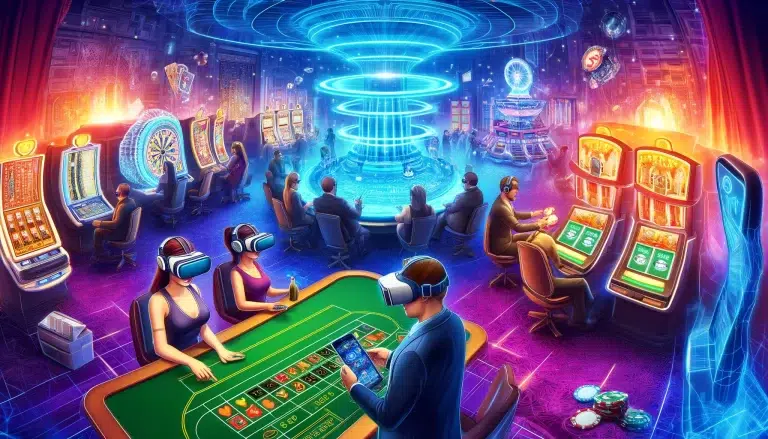As technology continues to evolve, the gambling industry is experiencing a significant shift with the emergence of virtual casinos. These platforms replicate the experience of a traditional casino in a digital format, using advanced technologies like virtual reality (VR) and augmented reality (AR) to create immersive and interactive gambling environments. This innovation is not just changing how players interact with games but is also reshaping the social dynamics of gambling.
Immersive Gambling Environments
Virtual casinos utilize VR and AR technologies to create fully immersive gaming environments that mimic the layout and atmosphere of physical casinos. Players can use VR headsets to enter a virtual casino where they can walk around, choose different games, interact with other players, and even sit at a gaming table. The realistic graphics and sound effects enhance the feeling of being in an actual casino, making the experience more engaging and enjoyable.
Real-Time Social Interactions
One of the standout features of virtual casinos is the ability to interact with other players and dealers in real-time. These platforms often include chat functions and even voice communication, allowing players to discuss games, share tips, or simply socialize. This level of interaction helps recreate the social atmosphere of traditional gambling venues, which is often missing in standard online casinos.
Wide Range of Games
Virtual casinos offer a broad array of games, from classic options like poker, blackjack, and slots to newer formats that are uniquely suited to the virtual environment. These games are designed with detailed, interactive interfaces that allow for easy navigation and enjoyable play. Many virtual casinos also introduce elements of video gaming, such as narrative-driven quests or character progression, to enhance the gaming experience further.
Accessibility and Convenience
While providing an experience close to that of a physical casino, virtual casinos also offer the accessibility and convenience of online gambling. Players can enjoy their favorite games without needing to travel, accommodating those who live far from casino hubs or have mobility issues. Furthermore, virtual casinos are accessible 24/7, giving players the freedom to gamble at their convenience.
Challenges and Future Prospects
Despite their many benefits, virtual casinos face challenges, particularly regarding technology adoption and regulatory compliance. High-quality VR equipment can be expensive and may not be accessible to all players, potentially limiting the user base. Additionally, as with all forms of online gambling, ensuring fair play and securing personal and financial data are paramount.
Looking forward, the potential for growth in the virtual casino sector is significant. As VR technology becomes more affordable and widespread, more players are likely to adopt this new form of gambling. Furthermore, ongoing improvements in VR and AR technologies could lead to even more realistic and engaging gambling experiences.
Conclusion
Virtual casinos represent a groundbreaking development in the online gambling industry, offering players an immersive, interactive, and socially engaging gaming experience. As technology continues to advance, these platforms are set to become an increasingly popular choice for gamblers around the world, promising a blend of traditional casino elements with the convenience and innovation of online gambling.

David Harrison stands tall in gambling journalism, marrying his firsthand casino experiences with a deep understanding of betting psychology. His articles transform complex gambling jargon into engaging tales of strategy and chance, making the world of betting accessible and enjoyable. David’s knack for narrative extends beyond print, making him a sought-after speaker on gambling trends and future bets. In the realm of gambling, David is both a scholar and a storyteller, captivating readers and listeners alike.


